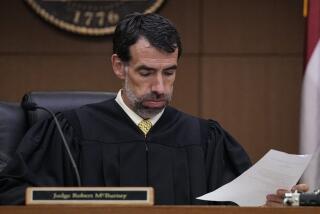Compton Decision: Too Clever by Half
When Los Angeles Superior Court Judge Judith Chirlin overturned the result of the Compton mayoral race last week and declared former Mayor Omar Bradley the winner of the election, she did more than add another twist to the dramatic and unpredictable politics of the city of Compton. She elevated social science over the democratic process in a way that is dangerous and unprecedented.
Many will recall the allegations after the 2000 election that the so-called butterfly ballot used in Florida’s Palm Beach County led a number of people who intended to vote for Al Gore to vote instead for Pat Buchanan. Buchanan received a statistically high number of votes compared to how he did elsewhere, which most social scientists say would not have happened by chance.
One proposed remedy to the butterfly ballot issue was to hold a new election in Palm Beach County, but a judge ruled that the Constitution requires all votes for the U.S. president be held on the same day. Others suggested “reallocating” the vote based on statistical studies showing that most of those Buchanan votes “belonged” to Gore.
This remedy, however, would have been unprecedented and would have allocated votes based, at best, on a social science guess.
Yet that is basically what the judge has done in the Compton case.
She ruled that the name of Bradley’s opponent, Eric Perrodin, illegally appeared first on the ballot and that Bradley did not give up his right to raise this issue by failing to call it to the attention of the city clerk before the election.
Both of these points are debatable.
State law on ballot order is subject to two interpretations, and Bradley’s election attorneys should have checked whether the ballot complied with state law. These arguments provide good grounds for Perrodin to appeal.
But even accepting the judge’s rulings on these points, the remedy is unsupportable.
The judge accepted the testimony of Jon Krosnick, an Ohio State University political science professor, that ballots are subject to a “primacy effect.”
Krosnick is no doubt right that those candidates who are placed first on the ballot tend to gain votes because of that placement. Whether it stems from voter laziness or some other factor, this advantage is so well known that California, like other states, requires use of a “randomized” alphabet for listing candidate names on the ballot in each election.
Krosnick testified that in his estimation Perrodin received an extra 300 or so votes because of his placement first on the ballot.
The judge took this educated guess by Krosnick--based on a study of Franklin County, Ohio, a place very different from Compton--which certainly has a significant margin of error, and she elevated it over the democratic process.
She viewed the testimony as if it established how people actually voted, and she used that testimony to put Bradley back in office.
No published cases of which I am aware establishes this remedy. Judges tend to overturn elections and install a different candidate only when the judge can identify a certain number of illegal votes cast and that affected the outcome of the election.
In this case, the number of illegal votes identified was smaller than the margin of difference between the two candidates.
There is no question that social scientists have established a “primacy effect.” But social science is not an exact science.
A judge should not credit an educated guess over the right of the people of Compton to choose their own leaders. If the judge believed the results were in doubt because of Krosnick’s testimony, a new election would have been the proper remedy.
*
Richard L. Hasen, a Loyola Law School professor specializing in election law, advised the city of Compton in the election dispute.
More to Read
Sign up for Essential California
The most important California stories and recommendations in your inbox every morning.
You may occasionally receive promotional content from the Los Angeles Times.










